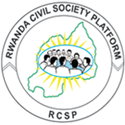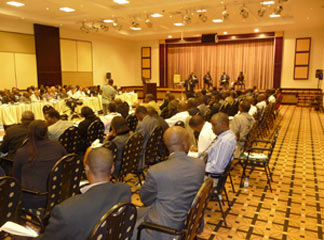
The Technical Meeting on the Evaluation of the Implementation of the 2010-2011 Gender Budget Statements of MINAGRI, MININFRA, MINEDUC, and MINISANTÉ was held on the 17 May, 2011 at Umubano Hotel, Kigali. This meeting was an essential component of the Public Policy, Information, Monitoring and Advocacy (PPIMA) Project which aims for Rwandan government policies and plans to deliver improved public services for poor Rwandans. Pro-femmes/Twese Hamwe and other PPIMA partners are collaborating to actively monitor, analyse and inform the government of Rwanda’s commitments, policies, and budget statements in order to promote gender equality and women’s empowerment.
The meeting was organized by the Gender Monitoring Office (GMO) and chaired by their chief Gender Monitor, Madam Oda Gasizingwa. Those in attendance included representatives from: the four Ministries presenting their Gender Budget Statements (GBS); the Ministry of Gender and Family Promotion; the Institute of Statistics; UN Women; Pro-femmes/ Twese Hamwe and Norwegian People’s Aid. The representative of the Ministry of Finance and Planning, whom was also supposed to present, did not attend.
First to present their GBS of 2010-2011 was MINEDUC. The presentation explained the activities that have been implemented and showed good progress for most of the planned activities; though the information given was not very specific. Following MINEDUC’s presentation was that of MININFRA who confessed to those present that their ministry had been previously informed that their gender budget statements for 2010/11 and 2011/12 were not good. The presentation showed implementation progress, but what was shown as achievements did not show a strong correlation with the gender situational analysis and the indicators set.
Next on the agenda for presenting was MINESANTÉ followed immediately after by MINAGRI. Both presentations were disappointing however, as neither presenter had the information that was requested of them. MINESANTÉ told participants that they do their reporting on an annual basis and therefore the information will be available in June of this year. MINAGRI explained that most of the planned activities have been completed but that she did not have data on the progress of implementation and that their reports are general and do not provide sex disaggregated data.
Although it was difficult to track the GBS of the four ministries as it was not fully clear which activities were actually implemented and which ones were not, nor how much of the allocated budget for activities has been spent and how much remains (if any), the meeting did create a space for dialogue and important discussion. There were complaints about how the GBS is prepared as there is an issue of implementing the activities since the GBS activities are usually not a priority among the highest levels and are therefore not a priority for others within the ministries. This lack of ownership means that gender is falling by the wayside. To curb this, participants recommended that there needs to be a change in mindset surrounding gender issues and that this change must start with the leaders and then be streamed downwards, otherwise nothing will change. Ministries should also have their own gender specialist who can monitor activities and ensure that gender issues are of importance and that these issues stay on the frontline.
Other key constraints surrounding GBS discussed included the lack of capacity to conduct a GBS, primarily the gender situation analysis and a lack of sex/gender disaggregated data as well as a reporting format and framework. To combat these constraints, participants suggested that extensive training needs to be conducted surrounding situation analysis so that the real issues can be discovered in order for the appropriate actions to be done to counteract those issues. The training, however, should be conducted before the planning stage of a GBS so that those who are conducting the GBS are fully informed of what it is that they need to do. In doing so, there will then be time to plan and prioritize the urgent issues.
Data must be disaggregated by sex in order to know the real progress and/or constraints of activities. As for a reporting framework, those present at the meeting suggested that GBS should be a part of the national reporting framework and not just an annex.
Although it was suggested to hold such a meeting before the Gender Budget Statements are submitted, the meeting was still a success. Gasizingwa of the GMO ended the meeting by telling participants “Whatever you do, sustainability must be participatory. We have become role models and a classroom for others; even other countries. So you should be proud when someone comes to learn from you about gender and GBS.”
Another meeting will take place in the near future, but the date and location have yet to be determined.
Written by PPIMA PROJECT NEWS





